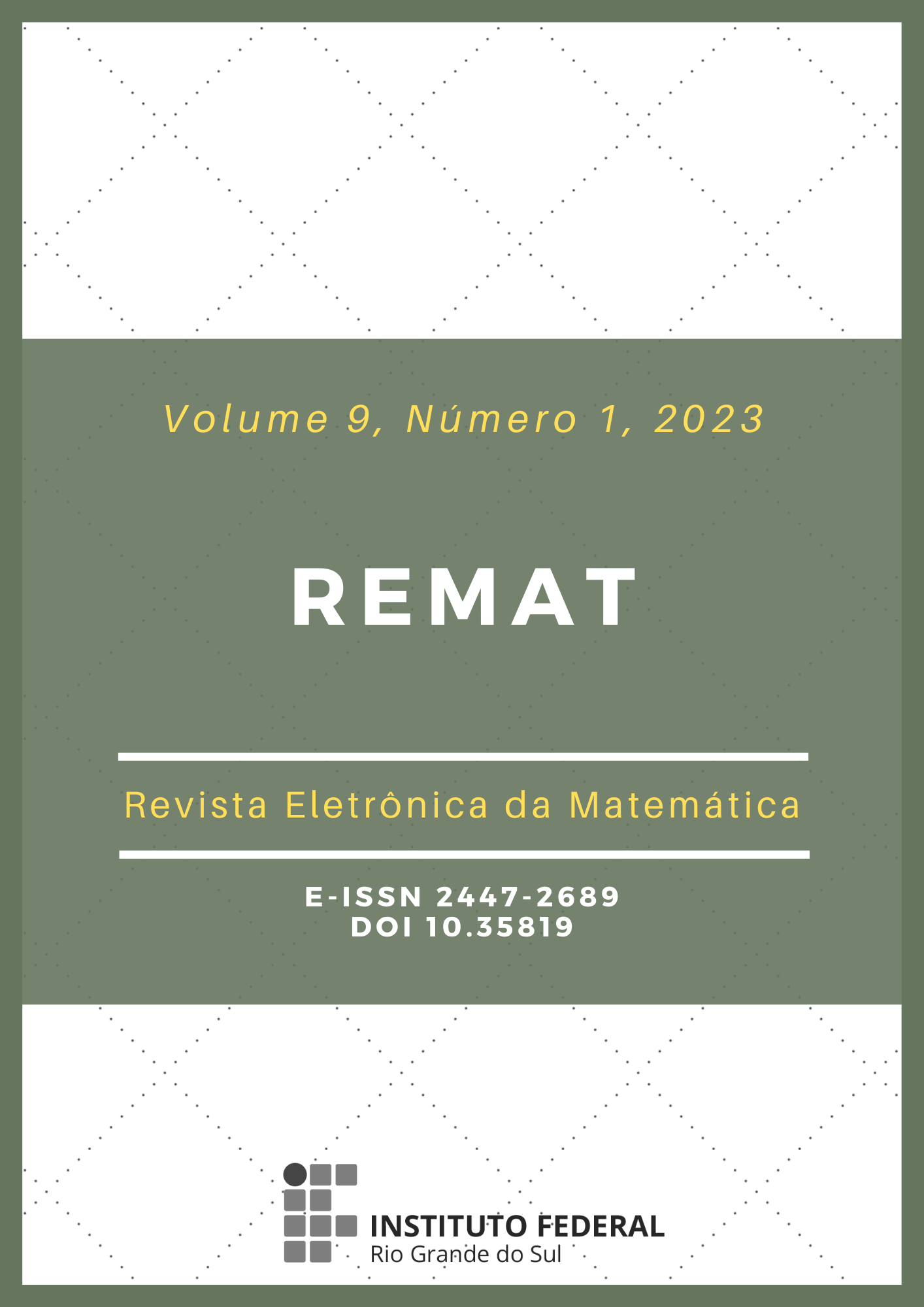Numerical solution of the temporal dynamics of SARS-CoV-2 infection in patients with severe or critical clinical manifestations of COVID-19
DOI:
https://doi.org/10.35819/remat2023v9i1id6289Keywords:
SARS-CoV-2, Viral Infection, Cytokine Storm, Numerical Solution, Severe COVID-19Abstract
COVID-19 is an infectious disease caused by the SARS-CoV-2 coronavirus that started in Wuhan (China) in late 2019 and has spread across the world. When the patient enters the severe clinical features of the disease, the immune system begins to produce pro-inflammatory cytokines in an uncontrolled way, a phenomenon known as ``cytokine storm'', causing Acute Respiratory Distress Syndrome (ARDS) and, from there, the patient's clinical condition is critical, requiring hospitalization in Intensive Care Units (ICU). In this article, we developed a mathematical model that describes the problem of temporal dynamics of SARS-CoV-2 infection in patients with severe or critical clinical manifestations of COVID-19; as a consequence, the problem includes the ``cytokine storm''. The model consists of a system of five first-order nonlinear ordinary differential equations, which is numerically solved using the Mathematica Software. Among the five variables involved in the system, viral load was the most detailed, as it describes the level of SARS-CoV-2 RNA in patients. Viral load profiles were presented and interpreted, in several situations, in which patients progressed to cure or death. For viral load, the model showed a relative error of 19.13% when compared to clinical data from the existing literature
Downloads
References
ACOSTA, R. Alfonso H.; GARRIGOS, Zerelda Esquer; MARCELIN, Jasmine R.; VIJAYVARGIYA, Prakhar. COVID-19 Pathogenesis and Clinical Manifestations. Infectious Disease Clinics of North America, v. 36, n. 2, p. 231-249, 2022. DOI: www.doi.org/10.1016/j.idc.2022.01.003.
AHMED, Nauman; ELSONBATY, Amr; RAZA, Ali; RAFIG, Muhammad; ADEL, Waleed. Numerical simulation and stability analysis of a novel reaction-diffusion COVID-19 model. Nonlinear Dynamics, v. 106, p. 1293-1310, 2021. DOI: www.doi.org/10.1007/s11071-021-06623-9.
BEAUCHEMIN, Caterine A.; HANDEL, Andreas. A review of mathematical models of influenza A infections within a host or cell culture: lessons learned and challenges ahead. Mathematical Modelling of Influenza, v. 11, n. S7, p. 1-15, 2011. DOI: www.doi.org/10.1186/1471-2458-11-S1-S7.
BEIJERINCK, Martinus W. Über ein contagium vivum fluidum als Ursache der Fleckenkrankheit der Tabaksblatter. Verh Kon Akad Wetensch, 65 (Sectie 2, Deel 6), p. 3-21, 1898 (Eng. translation: Concerning a contagium vivum fluidum as cause of the spot disease of tobacco leaves. Phytopath Classics, v. 7, p. 33-54, 1942). Disponível em: https://www.apsnet.org/edcenter/apsnetfeatures/Documents/1998/BeijerckSpotDiseaseTobaccoLeaves.PDF. Acesso em: 4 jan. 2023.
BERGE, T.; LUBUMAA, J. M. S.; MOREMEDIC, G. M.; MORRISD, N.; KONDER-SHAVAE, R. A simple mathematical model for Ebola in Africa. Journal of Biological Dynamics, v. 11, n. 1, p. 42-74, 2016. DOI: www.doi.org/10.1080/17513758.2016.1229817.
BOUCHNITA, Anass; JEBRANE, Aissam. A hybrid multi-scale model of COVID-19 transmission dynamics to assess the potential of non-pharmaceutical interventions. Chaos, Solitons & Fractals, v. 138, p. 1-12, 2020. DOI: www.doi.org/10.1016/j.chaos.2020.109941.
BOULOS, Maged N. K.; GERAGHTY, Estrella M. Geographical tracking and mapping of coronavirus disease COVID-19/severe acute respiratory syndrome coronavirus 2 (SARS-CoV-2) epidemic and associated events around the world: how 21st century GIS technologies are supporting the global fight against outbreaks and epidemics. International Journal of Health Geographics, v. 19, n. 8, p. 1-12, 2020. DOI: www.doi.org/10.1186/s12942-020-00202-8.
BRASIL. Ministério da Saúde. Guia de Vigilância Epidemiológica: Emergência de saúde pública de Importância nacional pela Doença pelo coronavírus 2019 - covid-19, Brasilia, 2021, p. 88. Disponível em:
https://coronavirus.saude.mg.gov.br/images/1_2021/17-03-Guia_de_vigilancia_da_covid_16marc2021.pdf. Acesso em: 28 ago. 2022.
CEVIK, Muge; KUPPALLI, Krutika; KINDRACHUK, Jason; PEIRIS, Malik. Virology, transmission, and pathogenesis of SARS-CoV-2. BMJ, v. 371, n. m3862, p. 1-6, 2020. DOI: http://dx.doi.org/10.1136/bmj.m3862.
FAJGENBAUM, David C.; JUNE, Carl H. Cytokine Storm. New England Journal of Medicine, v. 383, p. 2255-73, 2020. DOI: www.doi.org/10.1056/NEJMra2026131.
FARSHI, Esmaeil. Cytokine Storm Response to COVID-19 Vaccinations. Journal of Cytokine Biology, v. 5, n. 2, p. 1-3, 2020. Disponível em: https://www.researchgate.net/publication/349257945_Cytokine_Storm_Response_to_COVID-19_Vaccinations. Acesso em: 28 ago. 2022.
FENG, Zeqing; DIAO, Bo; WANG, Rongshuai; WANG, Gang; WANG, Chenhui; TAN, Yingjun; LIU, Liang; WANG, Changsong; LIU, Ying; LIU, Yueping; YUAN, Zilin; REN, Liang; WU, Yuzhang; CHEN, Yongwen. The Novel Severe Acute Respiratory Syndrome Coronavirus 2 (SARS-CoV-2) Directly Decimates Human Spleens and Lymph Nodes. medRxiv: preprint, p. 1-18, 2020. DOI: www.doi.org/10.1101/2020.03.27.20045427.
FREITAS, V. M. de. Abordagem Numérica da Dinâmica Temporal da Infecção do SARS-CoV-2: Tempestade de Citocinas. Orientador: Jorge Andrés Julca Avila. 2022. 65 f. Dissertação (Mestrado Profissional em Matemática em Rede Nacional) - Universidade Federal de São João del-Rei, Campus Santo Antônio, São João del-Rei, 2022. Disponível em: https://sca.profmat-sbm.org.br/profmat_tcc.php?id1=6800&id2=171055035. Acesso em: 25 mar. 2023.
FURUMOTO, Warren A.; MICKEY, Ray. A mathematical model for the infectivity-dilution curve of tobacco mosaic virus: theoretical considerations. Virology, v. 32, n. 2, p. 216-223, 1967. DOI: www.doi.org/10.1016/0042-6822(67)90271-1.
GUMEL, A. B.; SHIVAKUMAR, P. N.; SAHAI, B. M. A mathematical model for the dynamics of HIV-1 during the typical course of infection. Nonlinear Analysis: Theory, Methods & Applications, v. 47, n. 3, p. 1773-1783, 2001. DOI: www.doi.org/10.1016/S0362-546X(01)00309-1.
INSTITUTO BUTANTAN. A velocidade com que foi criada a vacina da Covid-19 é motivo de preocupação? Especialista do Butantan responde. Disponível em: https://butantan.gov.br/covid/butantan-tira-duvida/tira-duvida-noticias/a-velocidade-com-que-foi-criada-a-vacina-da-covid-19-e-motivo-de-preocupacao-especialista-do-butantan-responde. Acesso em: 25 ago. 2022.
OMS. Seguimiento de las variantes del SARS-CoV-2. Disponível em: https://www.who.int/es/activities/tracking-SARS-CoV-2-variants. Acesso em: 25 ago. 2022.
OPAS. Folha informativa sobre COVID-19. Disponível em: https://www.paho.org/pt/covid19. Acesso em: 25 ago. 2022.
PELAIA, Corrado; CALABRESE, Cecilia; GAROFALO, Eugenio; BRUNI, Andrea; VATRELLA, Alessandro; PELAIA, Girolamo. Therapeutic Role of Tocilizumab in SARS-CoV-2-Induced Cytokine Storm: Rationale and Current Evidence. International Journal of Molecular Sciences, v. 22, n. 6, 3059, p. 1-16, 2021. DOI: www.doi.org/10.3390/ijms22063059.
PURKAYASTHA, Soumik; BHATTACHARYYA, Rupam; BHADURI, Ritwik; KUNDU, Ritoban; GU, Xuelin; SALVATORE, Maxwell; RAY, Debashree; MISHRA, Swapnil; MUKHERJEE, Bhramar. A comparison of five epidemiological models for transmission of SARS-CoV-2 in India. BMC Infectious Diseases, v. 21, n. 533, p. 1-23, 2021. DOI: www.doi.org/10.1186/s12879-021-06077-9.
REIS, Ruy Freitas; PIGOZZO, Alexandre Bittencourt; BONIN, Carla Rezende Barbosa; QUINTELA, Barbara de Melo; POMPEI, Lara Turetta; VIEIRA, Ana Carolina; LIMA E SILVA, Larissa de; XAVIER, Maicom Peters; SANTOS, Rodrigo Weber dos; LOBOSCO, Marcelo. A Validated Mathematical Model of the Cytokine Release Syndrome in Severe COVID-19. Frontiers in Molecular Biosciences, v. 8, n. 639423, p. 1-13, 2021. DOI: www.doi.org/10.3389/fmolb.2021.639423} .
RUSSELL, Colin A.; FONVILLE, Judith M.; BROWN, André E. X.; BURKE, David F.; SMITH, David L.; JAMES, Sarah L.; HERFST, Sander; VAN BOHEEMEN, Sander; LINSTER, Martin; SCHRAUWEN, Eefje J.; KATZELNICK, Leah; MOSTERÍN, Ana; KUIKEN, Thijs; MAHER, Eileen; NEUMANN, Gabriele; OSTERHAUS, Albert D. M. E.; KAWAOKA, Yoshihiro; FOUCHIER, Ron A. M.; SMITH, Derek J. The potential for respiratory droplet-transmissible A/H5N1 influenza virus to evolve in a mammalian host. Science, v. 336, n. 6088, p. 1541-1547, 2012. DOI: www.doi.org/10.1126/science.1222526.
TAHIR, Khan; ULLAH, Roman; ZAMAN, Gul; ALZABUT, Jehad. A mathematical model for the dynamics of SARS-CoV-2 virus using the Caputo-Fabrizio operator. Mathematical Biosciences and Engineering, v. 18, n. 5, p. 6095-6116, 2021. DOI: www.doi.org/10.3934/mbe.2021305.
VOUTOURI, Chrysovalantis; NIKMANESHI, Mohammad Reza; HARDIN, C. Corey; PATEL, Ankit B.; VERMA, Ashish; KHANDEKAR, Melin J.; DUTTA, Sayon; STYLIANOPOULOS, Triantafyllos; MUNN, Lance L.; JAIN, Rakesh K. In silico dynamics of COVID-19 phenotypes for optimizing clinical management. PNAS, v. 118, n. 3, p. 1-18, 2021. DOI: www.doi.org/10.1073/pnas.2021642118.
WHO. WHO Coronavirus (COVID-19) Dashboard. Disponível em: https://covid19.who.int. Acesso em: 23 dez. 2022.
WANG, Sunpeng; PAN, Yang; WANG, Quanyi; MIAO, Hongyu; BROWN, Ashley N.; RONG, Libin. Modeling the viral dynamics of SARS-CoV-2 infection. Mathematical Biosciences, v. 328, p. 1-12, 2020. DOI: www.doi.org/10.1016/j.mbs.2020.108438.
ZHENG, Shufa; FAN, Jian; YU, Fei; FENG, Baihuan; LOU, Bin; ZOU, Qianda; XIE, Guoliang; LIN, Sha; WANG, Ruonan; YANG, Xianzhi; CHEN, Weizhen; WANG, Qi; ZHANG, Dan; LIU, Yanchao; GONG, Renjie; MA, Zhaohui; LU, Siming; XIAO, Yanyan; GU, Yaxi; ZHANG, Jinming; YAO, Hangping; XU, Kaijin; LU, Xiaoyang; WEI, Guoqing; ZHOU, Jianying; FANG, Qiang; CAI, Hongliu; QIU, Yunqing; SHENG, Jifang; CHEN, Yu; LIANG, Tingbo. Viral load dynamics and disease severity in patients infected with SARS-CoV-2 in Zhejiang province, China, January-March 2020: retrospective cohort study. BMJ, v. 369, n. m1443, p. 1-8, 2020. DOI: www.doi.org/10.1136/BMJ.M1443.
Downloads
Published
Issue
Section
License
Copyright (c) 2023 REMAT: Revista Eletrônica da Matemática

This work is licensed under a Creative Commons Attribution 4.0 International License.
REMAT retains the copyright of published articles, having the right to first publication of the work, mention of first publication in the journal in other published media and distribution of parts or of the work as a whole in order to promote the magazine.
This is an open access journal, which means that all content is available free of charge, at no cost to the user or his institution. Users are permitted to read, download, copy, distribute, print, search or link the full texts of the articles, or use them for any other legal purpose, without requesting prior permission from the magazine or the author. This statement is in accordance with the BOAI definition of open access.













 https://orcid.org/0000-0002-0893-7426
https://orcid.org/0000-0002-0893-7426


















